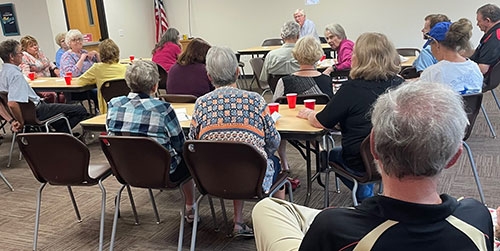You are here
Home ›Former Iowa Attorney General Tom Miller discusses the “fueling” of the Opioid Crisis

Former Iowa Attorney General discusses opioid crisis during visit to Waukon ... Former State of Iowa Attorney General Tom Miller visited Waukon Thursday, July 13 for a pair of events facilitated by the Allamakee County Democratic Party that evening and held in the Community Room at Robey Memorial Library in Waukon. After a meet and greet supper event that was part of the Democrats’ regular monthly meeting, Miller (pictured at the top of the above photo near the center) spoke to those in attendance about the opioid crisis, relaying his experience in spearheading a bipartisan effort of Attorneys General from numerous states filing lawsuits against opioid manufacturers and pharmacies for their role in fueling the opioid crisis, a legal effort that resulted in a settlement that yielded $345 million for the state of Iowa that was the distributed in all 99 counties throughout the state in an effort to combat the opioid crisis. Submitted photo.
Tom Miller met with a group of residents from Allamakee and Winneshiek Counties Thursday, July 13 to discuss the “fueling” of the Opioid Crisis in a public meeting held at Robey Memorial Library in Waukon. The meeting was facilitated by the Allamakee County Democratic Party. Among those attending were area health care providers, Allamakee County Board of Supervisors Chairperson Dan Byrnes, who is also a member of the Board of Trustees for Veterans Memorial Hospital in Allamakee County, and Jean Bossom, Allamakee Substance Abuse and Prevention (ASAP) Coordinator.
Miller explained the role opioid manufacturers and distributors played in escalating the ongoing opioid epidemic by promoting the sale and use of opioids while failing to inform and educate the public about the highly addictive nature of opioid drugs.
When Miller was Iowa’s Attorney General, he headed a bipartisan group of Attorneys General from a number of states in filing lawsuits against opioid manufacturers Teva and Allergan, AmeriSource Bergan, Cardinal and McKesson, as well as pharmacies CVS, Walmart and Walgreens. These corporations opted for settlements rather than defending lawsuits in court. As a result of the settlements, Iowa is receiving $345 million that will be paid over a period of time and is to be used for opioid recovery and prevention services.
Miller reported that all of Iowa’s 99 counties, as well as 43 cities, have signed onto the agreement to use the money to abate the opioid crisis in Iowa. During the meeting, Supervisor Dan Byrnes stated that, so far, Allamakee County has received $75,000 of the settlement money and has used half of the $75,000 for the Allamakee Substance Abuse and Prevention program. ASAP Coordinator Jean Bossom talked about the importance of prevention and education in stopping opioid addiction.
To help prevent opioid addiction, Miller said he used some of the settlement money for the GOLDFINCH Program, further explaining that the GOLDFINCH Program was started by two physicians at the University of Iowa. The goal is to reduce reliance on opioid medications for pain relief after surgeries by improving patient care before and after surgeries.
Where implemented in rural hospitals, GOLDFINCH has cut post-surgery opioid use by 70%. Miller stated Allamakee County’s Veterans Memorial Hospital is undoubtedly eligible for funds for the GOLDFINCH Program, and he said he will look into this.
Miller talked about how opioid addiction hits every community and has resulted in fatalities from overdoses. He noted Iowa has seen a 120% increase in overdose deaths since 2019 among people younger than 25. Many of the opioids are laced with fentanyl, a powerful synthetic opioid.
Miller explained that the Mexican drug cartels manufacture fentanyl and smuggle it into the United States through legal ports of entry. He noted that American citizens bring in 50% of the fentanyl. Miller said the notion that immigrants are solely responsible for fentanyl coming to the United States is wrong.

